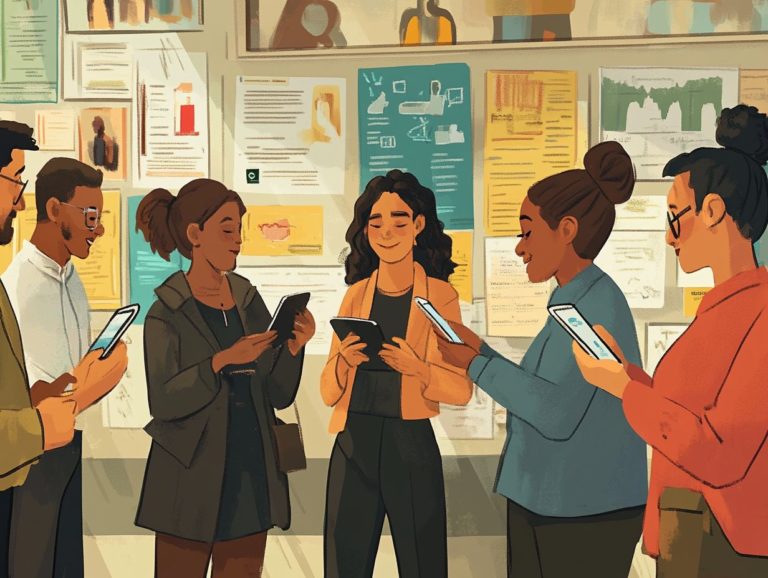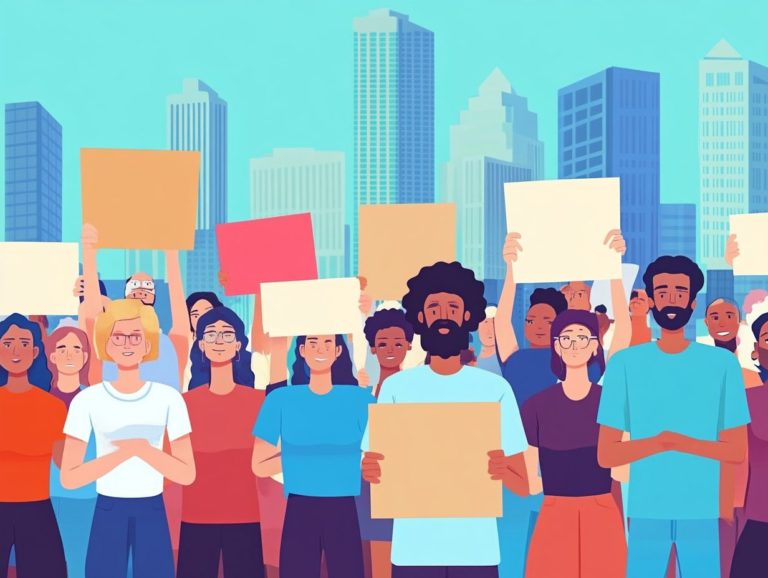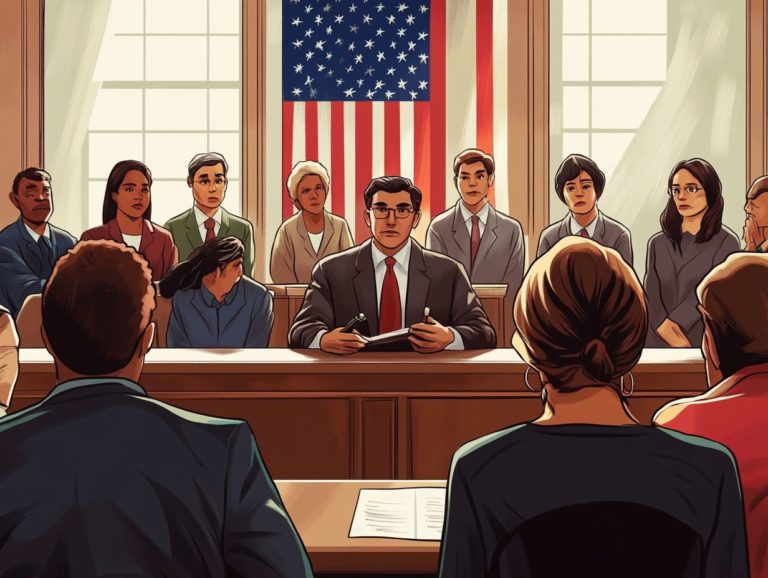5 Ways to Educate Yourself About Your Rights
Understanding your rights is crucial for navigating the details of everyday life; however, many individuals remain often unaware of the protections and privileges available to them.
This article explores five practical strategies for enhancing your awareness of your rights, ranging from grasping the basics to attending enlightening workshops. It also addresses common misconceptions and emphasizes the importance of staying informed about legal changes.
Empower yourself with knowledge and discover how being well-informed can profoundly impact your life.
Contents
- Key Takeaways:
- 1. Know Your Basic Rights
- 2. Stay Informed on Current Events and Changes in Laws
- 3. Attend Workshops and Seminars
- 4. Read Books and Articles on Your Rights
- 5. Seek Legal Advice if Needed
- Why Is It Important to Educate Yourself About Your Rights?
- Frequently Asked Questions
- What are the benefits of educating yourself about your rights?
- How can I educate myself about my rights?
- Are there any specific rights that I should focus on learning about?
- How often should I educate myself about my rights?
- Is it necessary to consult a legal professional when educating myself about my rights?
- What should I do if I feel like my rights have been violated?
Key Takeaways:
- Stay updated on law changes.
- Join workshops for practical tips.
- Seek legal advice if you have questions.
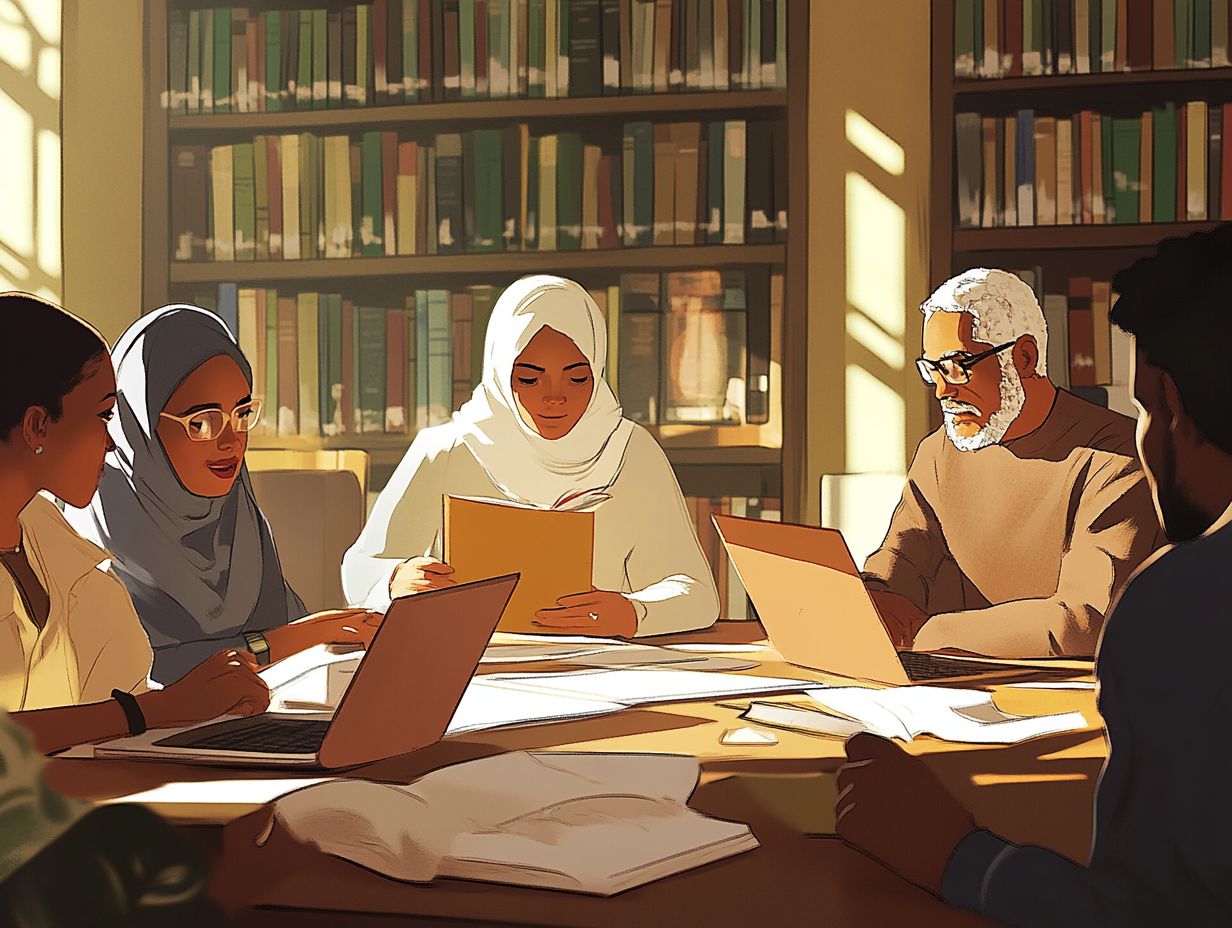
1. Know Your Basic Rights
Understanding your basic rights is essential for navigating the complexities of modern society; these rights are the foundation of freedom and justice.
Human rights, such as the right to learn, protect individuals from discrimination and enable full exercise of these rights. They are closely linked to education, equipping you to challenge injustices and advocate for yourself and others.
Education encompasses not only understanding your rights but also the historical struggles that have shaped them. By exploring milestones like the Civil Rights Movement, you gain a deeper appreciation for the ongoing fight against discrimination.
Recognizing your basic rights empowers you to take action whether reporting a violation or getting involved with your community contributing to a more just society for everyone.
2. Stay Informed on Current Events and Changes in Laws
Being informed about current events and changes in laws is vital for effectively understanding and exercising your human rights. This awareness helps you stay vigilant against discrimination and injustice.
You can build this understanding through reputable organizations like Amnesty International and Human Rights Watch, which provide updates on global issues. Movements like Black Lives Matter highlight the importance of getting involved with your community.
Following these organizations is beneficial. Subscribing to newsletters from human rights groups can offer deeper insights and timely information on pressing issues.
Community forums encourage discussions that foster collective understanding and enable informed actions. Social media platforms are also valuable for real-time updates and connecting with advocates.
By staying engaged and sharing knowledge, you and your community members can inspire one another, creating a formidable force in the ongoing struggle for justice and equality.
3. Attend Workshops and Seminars
Attending workshops and seminars focused on human rights education provides invaluable insights and tools for understanding your rights and advocating for others. These events often feature expert speakers from esteemed organizations like UNICEF, who discuss crucial topics and inspire engaging conversations.
Immersing yourself in storytelling related to human rights can motivate you to take action and become a true advocate for change.
Participating in these gatherings enriches your knowledge and opens doors to networking opportunities. You’ll connect with like-minded individuals and experts, creating a supportive community ripe for collaboration.
For example, workshops focusing on women s rights and racial equality provide tangible resources to deepen your understanding. Sharing best practices in these sessions helps you advocate effectively within your community.
Ultimately, these experiences enhance your personal growth and equip you to navigate and champion essential rights with confidence and purpose.
4. Read Books and Articles on Your Rights
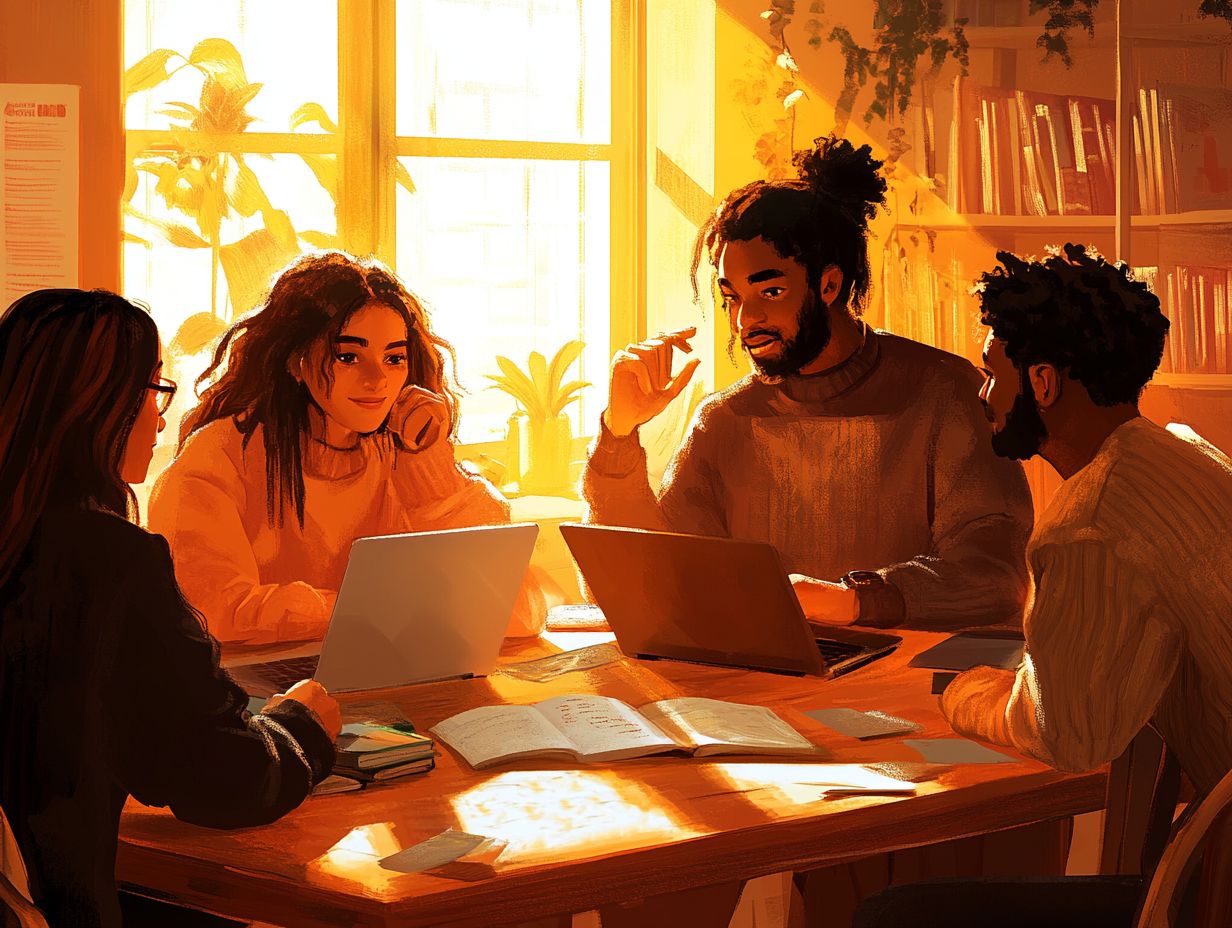
Reading books and articles about your rights is a great way to deepen your understanding of human rights and to clear up common misconceptions about your rights and the laws that protect them.
Literature on fair trial rights and LGBTQ community rights provides critical insights into the unique challenges faced by these groups.
Legal texts like The Era of Human Rights by Thomas Buergenthal offer a detailed look at how laws protect freedoms.
Memoirs such as Just Mercy by Bryan Stevenson highlight the human impact of legal systems.
Engaging with authors like Chimamanda Ngozi Adichie or Arundhati Roy gives you varied perspectives on human rights advocacy. Knowledge isn t just power; it s a spark for meaningful change.
5. Seek Legal Advice if Needed
Seeking legal advice when your rights are infringed is crucial for ensuring justice.
If you re dealing with workplace discrimination or feel uncertain about documenting incidents, reach out to a legal expert without delay.
Organizations like the ACLU provide legal help and educational resources to help you understand your rights.
If you face eviction or immigration issues, they can guide you through the legal maze so you are informed and effectively represented.
Why Is It Important to Educate Yourself About Your Rights?
Understanding your rights is vital for fostering a society that values justice and equality.
By learning about human rights, you can identify and combat unfair treatment, ensuring that freedoms like expression and protest are respected.
Recognizing international human rights standards allows you to advocate for yourself and others, creating a culture of active citizenship.
This awareness empowers you to make informed decisions and stand up against injustices in your community.
Being knowledgeable about anti-discrimination laws encourages you to support movements that challenge workplace harassment and racial injustices.
By joining local advocacy efforts or peaceful protests, you help shift narratives and build strong community solidarity. Be the change!
What Are the Most Common Rights That People Are Unaware Of?
Many people are unaware of their rights. This can lead to violations and injustices, especially related to discrimination and fair trial.
Commonly overlooked rights protect the LGBTQ community essential pillars of equality and justice. By understanding these rights, you can advocate for yourself and others, reducing the risk of discrimination in various situations.
You might not fully recognize your rights to privacy and freedom of expression. These are fundamental in today s digital landscape. Your right to privacy can be compromised when your personal information is shared without your consent. This underscores the importance of knowing how to protect your digital footprint.
On the flip side, the right to free speech enables you to express your opinions without fear of retribution, a cornerstone of democratic societies. Understanding how these rights function in real life nurtures a culture of informed citizens ready to challenge injustices and support marginalized communities.
Awareness is your first step to empowerment don t miss out on your rights!
How Can Educating Yourself About Your Rights Benefit You?

Educating yourself about your rights offers many benefits. It enables you to identify and confront injustices, such as digital discrimination and violations of fair trial rights. To get started, check out the top 5 apps to learn about your rights.
By understanding the legal frameworks that safeguard your rights, you can advocate effectively for yourself and others. This knowledge boosts your confidence and helps your community grow.
When you take the initiative to understand your rights, you may discover a renewed purpose that drives you to engage in local governance or community initiatives.
For example, someone who learns about their voting rights may rally their neighbors to ensure everyone participates in the electoral process, strengthening democratic structures.
Understanding your workplace rights can also empower you to speak out against discrimination, leading to meaningful policy changes within organizations.
The inspiring stories of activists who have turned systemic barriers into opportunities show how self-education can ignite significant societal transformations, paving the way for a more equitable future.
Explore your rights today and become an advocate for yourself and others!
What Are Some Common Misconceptions About Rights?
Several common misconceptions about rights may impede your understanding and ability to exercise your human rights. This is especially true regarding discrimination rights and the First Amendment.
For example, you might think freedom of speech is absolute, but this overlooks important nuances surrounding hate speech and actions that encroach upon the rights of others.
In truth, speech that incites violence or constitutes harassment is not protected under the First Amendment. This critical distinction is often misunderstood, leading individuals to misinterpret their right to express themselves while ignoring the potential consequences their words may have.
Regarding discrimination rights, you may assume laws apply uniformly in all circumstances, not realizing how context and specific legal frameworks can shape outcomes.
By clarifying these misconceptions, you gain a deeper understanding of your rights and responsibilities. This ultimately fosters an environment where rights are respected and protected.
How Can One Stay Updated on Changes in Laws and Policies?
Staying updated on changes in laws and policies is essential for anyone looking to advocate for human rights effectively. Don’t miss out on vital updates stay informed!
You can tap into valuable resources from volunteer organizations, like UNICEF support and newsletters from human rights groups that offer timely updates on legislative changes. Being proactive in seeking this information enables you to understand how new laws might impact your rights and those of others.
Following trustworthy news outlets can boost your awareness. Subscribing to updates from these sources ensures you receive breaking news and in-depth analyses directly in your inbox.
Engaging with community forums or local advocacy groups allows you to join discussions about these changes with like-minded individuals, gaining insights from various perspectives. Actively participating in these conversations builds a community and keeps you aligned with best practices for effective advocacy.
What Are Some Resources for Learning About Your Rights?
A wealth of resources awaits you for exploring your rights, ranging from dynamic online platforms to insightful publications from esteemed organizations like Amnesty International and Human Rights Watch. You ll discover a treasure trove of educational materials, guides, and articles that delve into essential human rights topics and advocacy strategies.
Engaging with these tools sharpens your understanding and provides actionable knowledge to protect and promote your rights and those of others. Numerous websites, such as the ACLU and the official United Nations site, regularly publish reports and updates on pressing global human rights issues.
Books by authors like Michelle Alexander, who expertly examine systemic injustices, can provide you with profound insights. Local organizations often host workshops and seminars, blending theoretical knowledge with practical skills.
By immersing yourself in these diverse resources, you can cultivate a deeper awareness of your rights. This knowledge nurtures a more informed and engaged citizenry ready to advocate for social justice. Take the first step today explore these resources to empower yourself!
Frequently Asked Questions
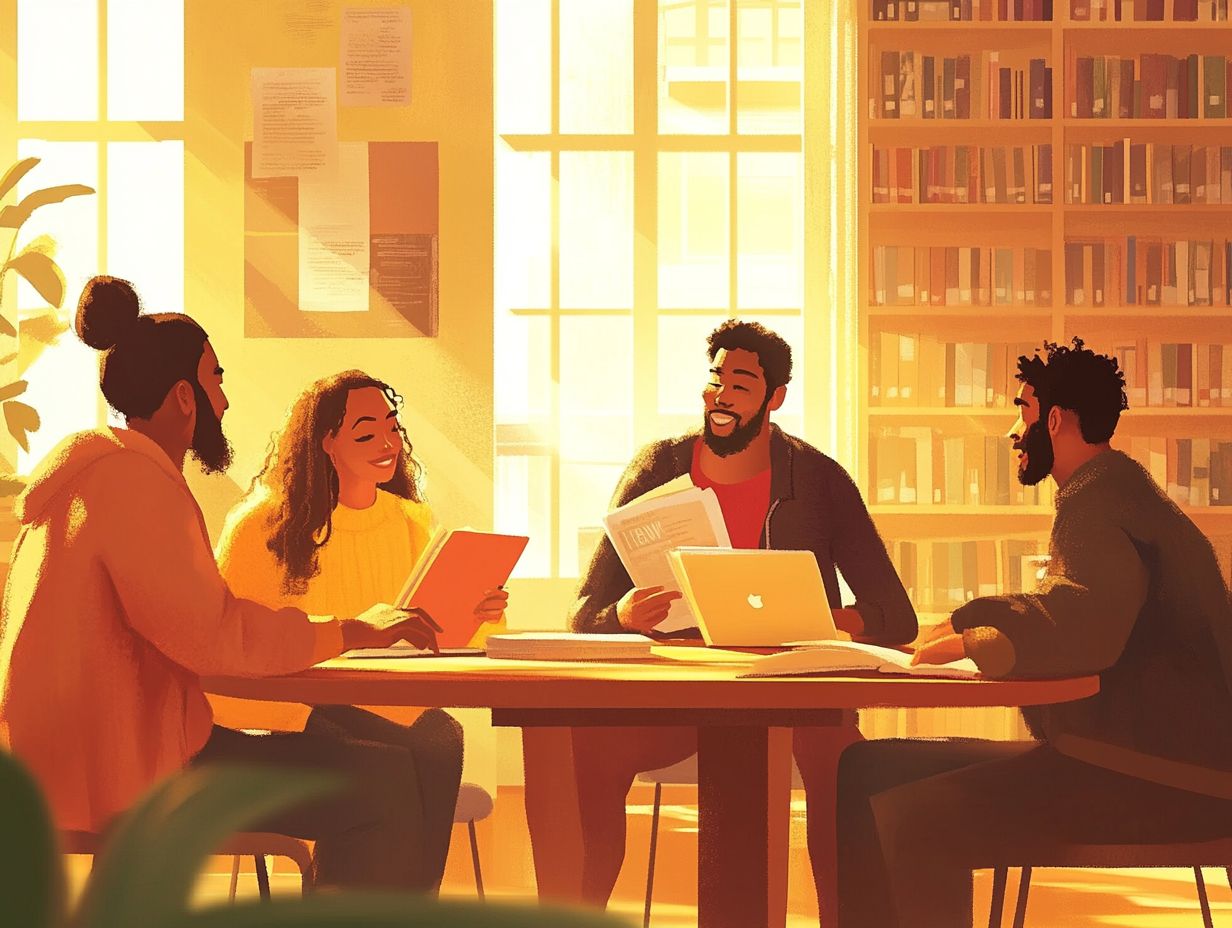
What are the benefits of educating yourself about your rights?
Educating yourself about your rights helps you understand and exercise them effectively. For guidance, check out how to stay informed about your rights, which protects you from injustice and enables informed decision-making.
How can I educate myself about my rights?
There are various ways to educate yourself about your rights, including reading books or articles, attending workshops or seminars, talking to legal professionals, joining advocacy groups, and doing research online.
Are there any specific rights that I should focus on learning about?
It is important to have a general understanding of all your rights, but you may want to focus on those most relevant to your situation or those that are commonly violated.
How often should I educate myself about my rights?
Staying informed about your rights is crucial, so it is recommended to educate yourself regularly, especially when there are changes in laws or policies that may affect you.
Is it necessary to consult a legal professional when educating myself about my rights?
While not necessary, consulting a legal professional can provide accurate and specific information about your rights. They can also assist with any legal processes or issues that may arise.
What should I do if I feel like my rights have been violated?
If you feel like your rights have been violated, seek advice from a legal professional, file a complaint with the relevant authorities, or join advocacy groups that can help protect your rights.

